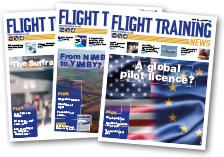Rome, Italy based ATO Urbe Aero has been trialling new neuroscience technology, designed to aid real-time evaluation of the different human factors that affect pilots.
Urbe Aero says that the aviation industry is moving away from an hours-based to a competency-based training approach and neuroscience is nowadays able to provide objective insights regarding human factors behind those core competencies that a pilot should overcome, such as mental workload, stress, and team cooperation.
With respect to the standard methods to evaluate human factors, such as subjective measures (e.g. questionnaires), neuroscience-based ones have several advantages, claims Urbe Aero, allowing an objective, non-intrusive, and even real-time measurements. Urbe Aero adds that decoding real time information of neurological states covertly, i.e. without asking anything to the user, could even make the surrounding environment able to automatically adapt itself to offer the most comfortable or safe condition, even before the operator becomes aware of the need to change something (e.g. lack of attention, or increased stress).
The EU-funded project, named Mindtooth, has spent five years trialling EEG headsets that can provide real-time neurometrics by holistically assessing the mental state of a general user in the fields of pilot training, car drivers and industrial workers. As a result of these projects, several neurophysiologic variables linked to the internal states of ‘Attention’, ‘Cognitive Workload’ and even ‘Cooperation between pilots’ have been employed and integrated in the Mindtooth technology.
Such technology has been already demonstrated in many ‘out-of-the-lab’ contexts (i.e. military and commercial pilots, air traffic controllers, car drivers, surgeons), by giving easy access to a large number of neural indicators related to different processes going on in the brain. The technology is fully compatible with aviation headsets, confirms Urbe Aero, and does not induce any discomfort during operational activities, as confirmed by a recent validation performed on 22 pilots at the academy’s training centre in Rome. The conclusion from the experiment is that such technology can be easily integrated into training school services to further improve the trainee’s assessment and training programme management by providing instructors with real-time evaluation of those human factors directly linked to pilot competences.







